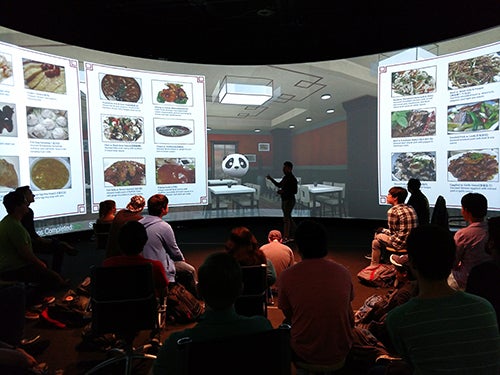
Rahul Divekar, a Rensselaer computer science graduate student, demonstrates an AI-assisted Mandarin Chinese language learning aid under development at the Cognitive and Immersive Systems Laboratory (CISL).
Anyone who’s struggled to get their point across in a foreign language they haven’t mastered knows the benefit of enlisting the full contents of the human communication toolbox: waving your arms, imploring with your eyes, describing the word you lack with an assembly of the words you have, even throwing in a little English when nothing else comes to mind is all part of the repertoire. It’s clunky, but our flexible human minds bridge the gap between the ideal words and meaning. The Mandarin Project – a reboot of an initiative launched in 2012 to combine narrative, game design, and augmented and virtual reality to teach Chinese — is the latest manifestation of CISL, which is dedicated to pioneering immersive and cognitive systems as an aid to collaborative problem-solving.
Yalun Zhou, who is aiding CISL in the project, said that for the students, the Mandarin Project represents a unique experience in academia.
The Chinese language learning experience that Studio 2 provides to RPI students is a one-of-a-kind educational experience that their counterparts in other universities cannot match… The ultimate goal of learning a foreign language is to use the target language to communicate with people of that language in a grammatically correct and culturally appropriate way. Research has shown that task-based, communicative language practices lead to the best results for that purpose. The immersive restaurant at Studio 2 provides a near real-life environment for RPI students to practice and test their abilities to complete a communicative task, i.e., ordering Chinese food with the AI waiter whose speech is generated from native speaker accents. This is an invaluable opportunity for the students who are unable to practice speaking with native speakers outside of the classroom.
Rahul Divekar, a Rensselaer computer science graduate student, demonstrates an AI-assisted Mandarin Chinese language learning aid under development at the Cognitive and Immersive Systems Laboratory (CISL). Divekar, himself a novice Chinese language learner, enters the cognitive and immersive restaurant environment CISL is building in the Curtis R. Priem Experimental Media and Performing Arts Center and holds a conversation in non-native Chinese with a Chinese language “waiter,” asking for a table for two, ordering a drink, and explaining the system along the way.
